
Ada Yardeni left us on June 29, 2018, after a fast-moving cancer. She was a wonderful woman and a world-renowned scholar in the field of Hebrew and Aramaic paleography.
After studying at the famous Bezalel Academy of Arts and Design in Jerusalem and working as a designer (creating the font “Ada”) at Koren Publishing Company and Carta Publishing Company, she studied Northwest Semitic inscriptions and languages at The Hebrew University of Jerusalem and prepared her thesis, The Aramaic and Hebrew Documents in Cursive Script from Wadi Murabba‘at and Naḥal Ḥever and Related Material: A Palaeographic and Epigraphic Examination (Ph.D. 1991), under the supervision of Professor Joseph Naveh.
Even before becoming a doctoral student, Ada specialized in paleographic research, including deciphering, drawing, and publishing ancient inscriptions and manuscripts in Semitic scripts. Her drawings/facsimiles of inscriptions were so famous that other scholars often asked her to draw the inscriptions they were publishing. She not only drew but also read these inscriptions. Trained in the most difficult cursive scripts, she knew the various shapes of the different letters and was able to read even faint traces of letters.
Her mastery of art and scholarship perhaps comes from her roots. Ada’s father was a religious scholar and her mother a pianist. Although her father passed away when she was only 17, her life always straddled the two spheres. Raised in the Rehavia neighborhood of Jerusalem, Ada was a longtime resident of Jerusalem. Similar to her father, Ada’s spouse died early in their marriage. Ada is survived by two daughters, Dafna and Hagit.
She published many articles and books on the general paleography of Hebrew and on important corpuses of Hebrew or Aramaic inscriptions (e.g., The Book of Hebrew Script [London, 2002]; Understanding the Alphabet of the Dead Sea Scrolls [Jerusalem, 2014]; Textbook of Aramaic Documents from Ancient Egypt, 4 volumes [with Bezalel Porten] [Jerusalem, 1986–1999]; Textbook of Aramaic Ostraca from Idumea, 2 volumes [with Bezalel Porten] [Winona Lake, 2014–2016]; and The Jeselsohn Collection of Aramaic Ostraca from Idumea [Jerusalem, 2016]). She was also interested in teaching the public through popular publications, including writing a number of articles for BAR.
She was passionate about her research and the discovery of the past. For her, any ancient document had to be scientifically published; she believed no document should be discarded. Well aware of the possibility of forgeries when dealing with unprovenanced inscriptions and in alignment with the view of her mentor in epigraphy, she thought that an experienced epigrapher should be able to distinguish forgeries from genuine inscriptions. At the same time, she was cautious when proposing a reading of damaged or faint inscriptions that, she explicitly said, were sometimes unclear, uncertain, or conjectural. She was unpretentious, more driven by her passion for epigraphy than by seeking honors—and she always took care of people, especially her colleagues. No wonder she donated her body to science when she passed away. The scientific community has lost its best Hebrew and Aramaic paleographer.—André Lemaire, Honorary Professor of Hebrew and Aramaic Philology and Epigraphy, École Pratique des Hautes Études, Sorbonne

